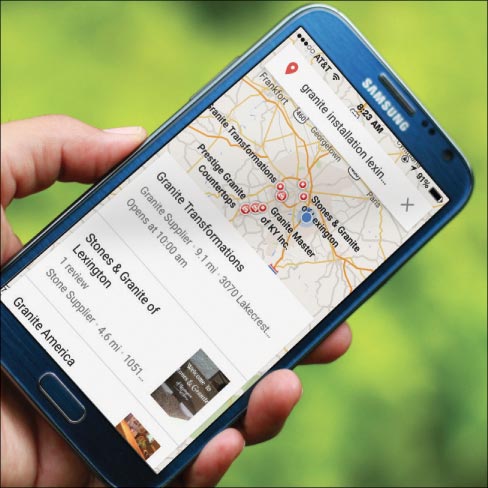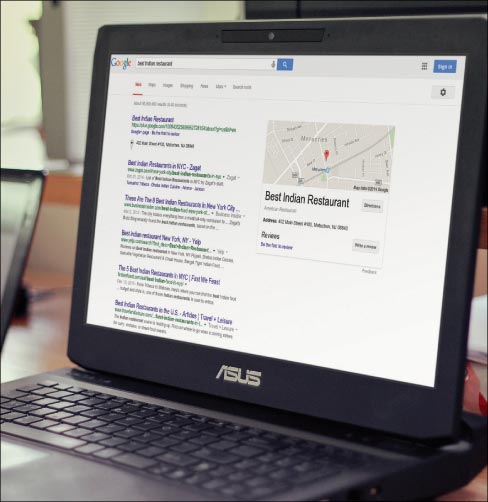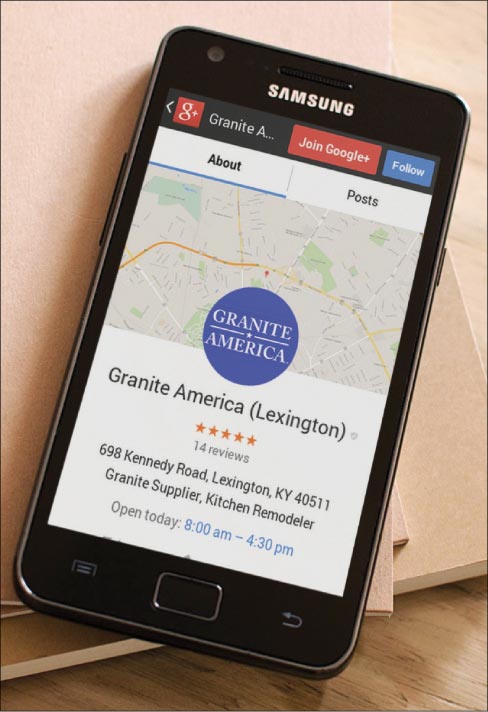9 Out of 10 Customers Are Using Mobile Search to Find Your Local Business
Local SEO Can Help Them Find You
Jennifer Stagner
Special Contributor
 Local SEO helps your business and service offering show up when prospective customers are searching for granite installation providers in their town or neighborhood.
Local SEO helps your business and service offering show up when prospective customers are searching for granite installation providers in their town or neighborhood.
 Your business needs customers to survive. Existing customers provide a base of business from which to operate; the relationships you’ve nurtured with them and the quality service you’ve provided often lead to repeat purchases and favorable word of mouth marketing. Attracting new customers is equally important; they create opportunities for you to grow and expand. The challenge, though, can be reaching both existing customers and new prospects in a digital age where every service and every provider is just a few clicks away on the internet. How then are you able to get your brand in front of customers when they’re looking for the exact services you offer? The good news is that local SEO (search engine optimization) helps you reach prospective customers in your local area when they’re in a purchasing frame of mind.
Your business needs customers to survive. Existing customers provide a base of business from which to operate; the relationships you’ve nurtured with them and the quality service you’ve provided often lead to repeat purchases and favorable word of mouth marketing. Attracting new customers is equally important; they create opportunities for you to grow and expand. The challenge, though, can be reaching both existing customers and new prospects in a digital age where every service and every provider is just a few clicks away on the internet. How then are you able to get your brand in front of customers when they’re looking for the exact services you offer? The good news is that local SEO (search engine optimization) helps you reach prospective customers in your local area when they’re in a purchasing frame of mind.
 Although they have some similarities, local SEO is ultimately very different from organic SEO. Specifically, the goal of local SEO is to provide the most relevant results to a searcher based on their current geographic location. For example, Google’s formulas are precise enough to understand that when a family is searching for “best Indian restaurant” they don’t want to see results for restaurants in other states; they want to see the top results closest to them, and reviews, a map, a phone number, and operating hours are the facts they’re most interested in.
Although they have some similarities, local SEO is ultimately very different from organic SEO. Specifically, the goal of local SEO is to provide the most relevant results to a searcher based on their current geographic location. For example, Google’s formulas are precise enough to understand that when a family is searching for “best Indian restaurant” they don’t want to see results for restaurants in other states; they want to see the top results closest to them, and reviews, a map, a phone number, and operating hours are the facts they’re most interested in.
Local SEO helps you to show up in searches where a prospective customer wants to work with someone in the same town or neighborhood. Often, the results take the form of “local citations” which are entries in maps or online directories such as Yelp, Foursquare, or Google My Business.
Because so many of these searches now happen on mobile phones, local SEO can help you get your service list and phone number to a prospective customer regardless of whether or not you have a website.
According to Forbes (Conner, 2013), 91 percent of adults have their smartphones within arm’s reach; there are five times as many cellphones in the world as PCs. 9 out of 10 mobile searches lead to action, and more than 50 percent lead to sales. 70 percent of mobile searches actually lead to action within one hour whereas it takes a full month for the same percentage of desktop users to catch up. With those kinds of numbers, it’s no wonder why local SEO has become so critical for small businesses.
Given that Local SEO is so important, what is it and how do you leverage it to the fullest effect for your business? These top five tips will help you do both:
In Online Listings, You Must Be Consistent and Precise
Local SEO’s emphasis is on three main components, often referred to as NAP. NAP is a quick way to remember Name, Address, and Phone number. Local search engines and directories use computer algorithms to detect the NAP of a business and differentiate it from other businesses with similar profiles. For example, there are a ton of Indian Restaurants in a city, but each one has a unique name, address, and phone number, and that is how they’re differentiated in local search results. The key to showing up more frequently in those results is to be accurate and consistent in every online directory or mention.
For example, if your business is called Smith Construction at 100 Main Street in Yelp, but Smith Granite Installation at 100 Main St. in Foursquare, and Smith Kitchens and Counters at 100 Main Str. Suite 100 in Yahoo, then the search engines are going to have trouble understanding all three are actually the same business. Any reviews or interest in each entry will be watered down in results because the search engine has trouble combining the data. However, if every online mention is 100% consistent and refers to Smith Granite Installation, Inc. at 100 Main Street Suite 100, then your business automatically increases its chances of improving visibility.
Leverage Additional Data Fields in Directory Listings to Maximize Your Visibility
When prospective customers search for a local business, they often want to see more than just the name, address, and phone. According to Google’s study of consumers’ local search behavior (Google, 2014), the business hours, directions to the business, and distance from their current location are also important. Additional helpful fields include the service listings, products offered, reviews, forms of payment, and company brand images. While it may be tempting for a business to skip these fields when submitting local directory information, it’s important to fill out the information as completely as possible to increase your odds of generating local business.
Reviews and Customer Testimonials are an Essential Component
Customers searching online want to feel confident in their decision and research on a business. Reviews from other consumers help them differentiate service providers. A business with many positive online reviews is much more likely to receive a prospective customer’s call than a business that has no reviews. Google’s formulas are aware of this and tend to favor businesses that customers are responding positively too.
As a business owner, there are several ways to motivate your customers to go online and write positive reviews. Often it’s as simple as asking a satisfied customer to do so when you know they’re pleased with the finished service you provided. To make it even simpler to get reviews from customers, a great tip is to print online review links or a QR code linking to your business listing on Yelp, Google+, or Foursquare on a business card with instructions on how to place a review. If your service technicians, sales reps, or customer support team hands these cards out to customers or displays them prominently you’re more likely to generate reviews.
Stay Ahead of the Curve by Adding Neighborhood Data
According to Andrew Shotland of Search Engine Land (Shotland, 2014), Google is adding neighborhood data to its search formula, and there are steps you can take to leverage your neighborhood visibility. Add your neighborhood name to the description on your Google My Business page, make sure Google Maps has your neighborhood defined correctly or submit an update via Google MapMaker, and add your neighborhood to all of your local citation profiles.
Social Media is Now Often Used as much as Websites to Research Businesses
Having a business website is great; it centralizes information and gives customers a place to go to learn about your products and service offering. However, many of today’s prospective customers are using social media sites to look for that same data. With the emergence of social media, a local business can actually thrive on local SEO even if they don’t have a website. Customers today can find out everything they need to about your business from your business Facebook page. By creating a business social media account and sharing information that customers are interested in, such as pictures of successful installs, happy customer reviews, or hours of operation, you’ll be a step ahead of the competition and more likely to acquire new prospects.
There are ways to optimize your social media accounts specifically for local business marketing. A few tips from Quick Sprout (Patel, 2012) include creating your Facebook page as a “Local Business or Place” when asked what kind of page you’d like to make. Once created, make sure you enter precise information in all of the fields, including local phone number and business hours. To help get your Facebook page in front of a local audience, you can invite your friends with Facebook’s “invite email contacts” option, click “follow” on other local businesses in the area whose fans can also become your fans, target your status updates by location (simply change the dropdown your status update from Public to Targeted by Location, where you can select your city), and even take advantage of low-cost, high-return Facebook ads, which “boost” your post’s visibility in your specified area.
Getting Started
Now that you understand the potential and importance of local SEO, how do you get started? You can always begin by creating a Google Maps entry for your business and filling out all the relevant fields, creating local citation entries on places like Yelp or Foursquare, and starting a business social media account. Or, if you don’t have the time to research local citation opportunities, ensure your business information is perfectly consistent, monitor your entries for accuracy, and find and update each one on the internet when your business data changes, there are service providers available to take the pain out of location data management.
For example, Navante LLC, eliminates the hours of work and cost by managing your business information on your behalf. They can help your business craft optimized service descriptions, survey you to get a keen understanding of your target market, and aggregate all of the relevant local SEO data such as business logos, taglines, or marketing messages about your competitive advantage so you show up in the best light to prospective customers. Navante then pushes your business information out to all of the major data aggregators that send information to local search engines: Infogroup, Neustar Localeze, Acxiom, Factual, and Foursquare. We monitor your data and ensure the accuracy and consistency of your business representation across the web, deleting duplicate listings, correcting outdated information, and filling in additional fields relevant to consumers. For clients who are interested in increased visibility, we also offer assistance creating and optimizing social media accounts, generating review cards to hand out, and constructing websites if needed.
Whether you choose to take on the task of local SEO yourself or through an agency, increasing visibility to your business so that new customers can find you is a great way to start the new year in 2015.
Jennifer Stagner is a Founder and the Chief Operating Officer of Navante LLC. For more info on Navante LLC please contact Navante at info@navante.com .